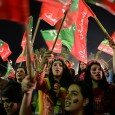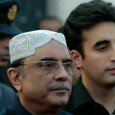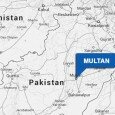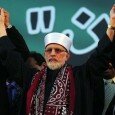By Irfan Bukhari –
Is PTI on the verge of political demise?
Pakistan Tehreek-e-Insaf (PTI), the third-largest political party of the country led by cricketer-turned-politician, Imran Khan, is all set to go for the biggest mobilisation of the country’s political history by arranging a gathering of one million protesters in the federal capital – an uphill task never achieved by any politician in the country.
Though PTI’s top-notch political leadership is involved in hectic tours across the country, it’s Punjab, the largest populous province of the country, that is the main focus for the PTI leaders where PTI has emerged as the second largest party after the ruling Pakistan Muslim League-Nawaz.
Punjab also is a bone of contention between both the parties as the hue and cry made by PTI chief Imran Khan about the alleged vote fraud is about four constituencies of the same province.
Central Punjab, the heartland of the ruling PML-N, is the region which is also claimed by PTI as its main base. This is despite the fact that the PTI has won majority of its winning constituencies from Khyber Pakhtunkhwa, where the PTI not only won majority national and provincial assembly seats but also the right to form the provincial government.
Though PTI chief Imran Khan has been accusing the ruling PML-N of massive vote fraud, his own party is suffering from major contradictions some of which are highlighted below.
Democracy within party?
Although apparently, decisions in PTI are made by the party’s central executive committee (CEC), the constitutional body for this purpose, but practically the CEC has quietly been replaced by a handpicked group of cronies of Khan named Core Committee, making a mockery of the claims of Khan to be a democrat and constitutionalist.
Many PTI leaders have raised their voice against the violation of the party constitution by Khan, who spares no time in making tall claims of supremacy of the rule of law.
“In the PTI, it is said that the final word is the one which comes from its chairman’s mouth rather than the core committee meetings, the members of which have now soared to 42 now, from the initial 15. Before the meetings they are not only told the agenda of the meeting but also about the line the chairman will take.
“No member dares challenge the opinion of the chairman, though some members differ but their differences are kept aside,” said a top PTI leader requesting not to be named.
Interestingly on July 15, the PTI core committee was supposed to meet after Iftaar to decide the date of the long march in lieu of the government announcing independence day celebrations on Parade Avenue in Islamabad but the press conference was held even before the meeting, in which Khan announced that PTI’s long march date and venue will remain unchanged.
Rigged party polls
Though PTI chairman is protesting against the 2013 general elections, held under official caretakers, the intra-party elections held under Khan’s nose can also be termed as ‘grossly rigged’ and in violation of laws to get cronies elected to top offices.
The inner circles of PTI allege that the intra-party polls conducted in 2012-2013 were not fair and rigging took place from district to provincial level. During the whole election process every group contesting intra-party polls levelled charges of rigging against their opponents. Polls were marred by scuffles and protest demonstrations occurred in the country and dozens of party workers also parted ways with the PTI during this time.
A group of armed men even attacked their own Election Commission Secretariat for showing bias towards the winning candidate because some ballot boxes went “missing” from the scene. The attackers were led by the brother of Mehmoodur Rasheed, the PTI’s leader of opposition in Punjab Assembly who contested for top slot in Punjab. Scores of other PTI members and the Insaf Students Federation (ISF) leaders also attacked the polling booths.
Abdul Aleem Khan committed massive vote manipulation in intra-party elections and managed to get himself elected as Lahore President.
PTI’s Chief Election Commissioner Hamid Khan Advocate, himself a top lawyer leader and PTI candidate who submitted petition after petition against rigging in NA-125, Lahore, had constituted a committee headed by Gen(r) Anees Bajwa to probe the allegations of intra-party poll rigging. General Bajwa had visited Kissan Hall, got statements from the concerned people but has not announced any decision so far.
When Pervez Khattak, the party’s secretary-general, vacated his post after being elected chief minister KP, he was replaced by Jahangir Tareen without any poll and in violation of the party’s constitution. Tareen invests generously in the party and provides logistics like choppers and jets to Khan for his travelling.
Corruption closer to home
Though Khan is vocal against the alleged corruption by top PPP and PML-N leaders, his own house is not entirely in order either.
Saifullah Niazi who is Additional Secretary General of PTI, launched ‘Zam Zam Cola’ business in 2005 but the venture flopped badly. The investors were chasing Niazi, who had taken shelter at Umar Cheema’s house in Lahore.
This hunting continued for half a decade. However, in 2011 when PTI started receiving huge funds from home and abroad, the chasing stopped and Niazi emerged again. Since Niazi himself was a signatory for withdrawal of any amount from the party’s funds, he has no loans to pay, no defaults whatsoever – all cleared within three years.
After the 2013 general elections, former secretary interior now PTI expert Tasneem Noorani gave briefing on reasons of election defeat and during the same meeting the issue of awarding tickets to inappropriate or weak candidates also surfaced. There were allegations that some central leaders like Javed Hashmi and Ijaz Chaudhry had taken bribes from influential aspirants but no inquiry, no disciplinary action was taken against anyone.
Money matters
All those who can spend money on Khan, they can get positions in PTI like Jahangir Tareen, Usman Dar, Abdul Aleem Khan. Dar also spent generously by taking care of Hashmi. Dozens of PTI candidates lost elections and levelled charges against winning candidates and are also fighting cases in tribunals but Khan’s demand of thumb audit for four constituencies was about those people who were rich like Tareen, Dar, Hamid Khan and himself.
Abdul Aleem Khan, offered a black Prado for Khan’s private use and in return he was blessed with the pricy election as President of PTI Lahore District. Khan also did not pay heed to massive vote fraud by Aleem and his cousin Faraz who managed to get Aleem elected as Lahore President through massive rigging.
No justice for his own
Fauzia Kasuri, the party’s only committed ideological leader, was neglected by Khan after 2013 elections despite her sacrifices for the party and was not even given a chance to withdraw from her dual nationality. Khan’s social media specialist, Shireen Mazari was the first to go on the reserved seats list. Second went to the charming Ayla Malik, however her fake degree issue got her name struck off fairly soon.
Hashim Khan Babar, a founding leader of PTI, was also ignored by Khan as he comes from a middle class background. Babar also had the problem of speaking his mind and offered advice based on logic and principles, advice that was usually shrugged away by Khan. Same was the case with Inamullah Niazi and Hafeezullah Niazi.
Foreign influence
Dr Shireen Mazari, PTI’s information secretary, parted ways with the party when Khan did not go to Rajan Pur to attend a public procession arranged by her. After addressing a rally in Bhakkar in early 2013, Imran was supposed to go to Rajan Pur but on the advice of Tareen he postponed his scheduled visit. Mazari got her position back because of strong and continuous efforts from the Khakis.
Sheikh Rashid, a foreigner in PTI, commonly influences PTI policies and Khan’s decisions. He is disliked the most by old ideological companions of Khan.
Freedom of expression
It’s a crime in PTI to speak against Khan’s version of events and this is reason that there is no room in PTI ranks for talking sense. Whether it is PTI president Javed Hashmi or anyone else, if his/her remarks catch the ire of Khan, there is literally no place for such a person in PTI.
Javed Hashmi, PTI’s elected president and a known democrat, was very unpopular among PTI since he praised Nawaz in the National Assembly after the 2013 general elections. Now, according to PTI leaders, Hashmi waits at the ground floor of Khan’s Bani Gala house just to see his party leader whenever he visits Khan’s home.
Hashmi’s remarks praising Sharif have cost him dearly. But he is not a lone soldier in this case as many of his predecessors in PTI have had a fall from grace after upsetting Khan. The queue is long but one can mention the likes of Hashim Khan Babar, Inamullah Niazi, Hafeezullah Niazi, Masood Sharif Khattak, and Naveed Ahmed Khan.
Inamullah and Hafeezullah Niazi are not only first cousins of Khan but they had also joined Khan’s ranks when the PTI leader had only a dozen followers.
Khan’s about-turns
In the 2001 referendum, Khan announced support for the military dictator General Pervez Musharraf. PTI during 2001 held many massive public processions to support Musharraf. However, when Musharraf refused to get Khan elected as prime minister, Khan turned against him.
Same was the case when Khan announced to lodge criminal cases against MQM chief Altaf Hussain some seven years back. He went to London and hired lawyers to contest cases against Hussain. However, he soon lost interest and the cases were dropped.
Then in 2013 elections, Khan again turned against Altaf and got registered an FIR against the MQM leader for allegedly killing of a PTI local leader Shahida Hasan. Around 30,000 calls were registered by Scotland Yard and London police by PTI workers against Altaf’s ‘hate speech’ three days later.
Soon afterwards, Khan lost interest in pursuing the case and recently, when Altaf Hussain was arrested in London, Khan issued a statement denouncing the arrest and expressing sympathies with MQM workers.
A similar love-hate relationship has been maintained by Khan with Prime Minister Nawaz Sharif. During electioneering process, Khan held Sharif as the most corrupt politician Pakistan ever produced.
However, after elections, Khan was all praises for Sharif when the latter visited his Bani Gala residence. Now Khan has again turned against the PM.
Khan has been very critical of PPP co-chairman and former president Asif Zardari and even refused to take oath from him if he was elected as prime minister of the country in the 2013 election. However, recently when Zardari issued a positive statement acknowledging PTI’s demand for vote verification, Khan was all praise for Zardari. Imran Khan’s love -hate relationship with former chief justice Iftikhar Muhammad Chaudhry also reflects his immature political attitude.
Same is the case with Sheikh Rashid. In the year 2004, Khan had termed Rashid the worst politician Pakistan had ever produced. Rashid also had termed Khan a lone politician who lacked political wisdom and pragmatism.
However, not only did Khan enter into a political alliance with Sheikh Rashid but Khan also got him elected with PTI’s support base in Rawalpindi despite the fact that Rashid had lost three previous elections in a row. Rashid allegedly influences PTI policies and Khan’s decisions despite being disliked by most old ideological companions of Khan.
PTI’s million march
Khan has now announced a million-march towards Islamabad on the independence day of Pakistan, 14th August 2014. Many within and outside the party are questioning the timing for the call of this long march. They point out the human tragedy unfolding from the displacement of over 1,000,000 IDPs, possible ramifications for operation Zarb-e-Azb, and the limited resources available to prepare for such catastrophic events. Some even point towards the possibility of another coup.
A million strong show is something that the PTI, despite its claims of massive popularity, has never achieved and it doesn’t look likely that these numbers will be achieved in such tumultuous times.
One key lesson any student of politics can glean from this is that mere agitation has never been able to shake any government in Pakistan without the implicit or explicit support of the establishment. As of now, the establishment is not only bogged down in a multitude of serious problems but over-stretched too.
However, Khan is going to face a defeat in any case. Even if he gathers around 200,000 people in Islamabad and this protest turns ugly, the military may takeover and the establishment is not going to install Khan as premier. The institution always likes to implement its own plan in such cases.
But if Khan miserably fails to muster the street muscle he has claimed, his political future may suffer a huge damage and his reputation might never recover.
The writer is the managing editor






























































































